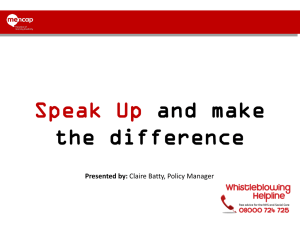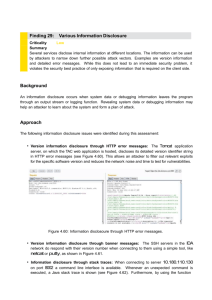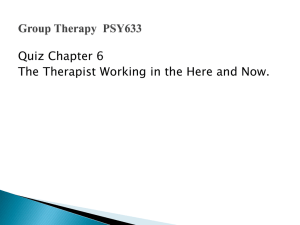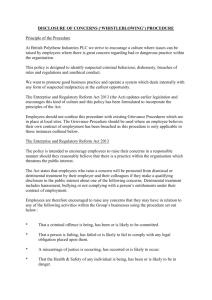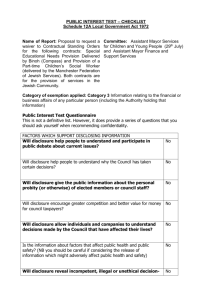7.6 Whistle Blowing Policy - Countess of Chester Hospital NHS Trust
advertisement
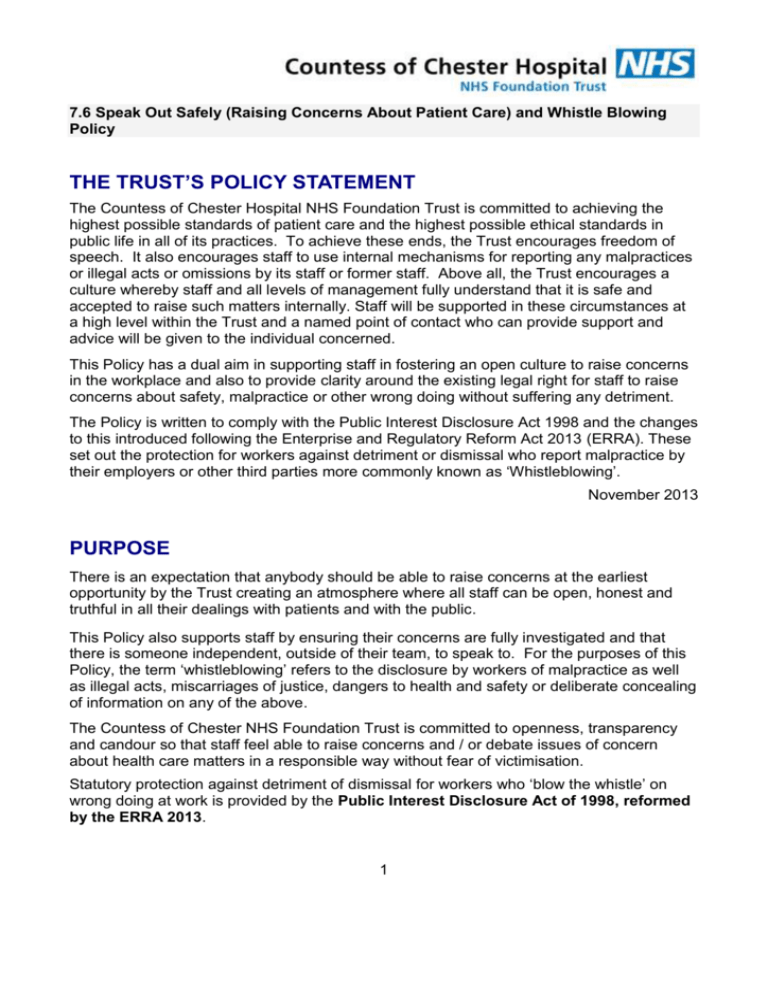
7.6 Speak Out Safely (Raising Concerns About Patient Care) and Whistle Blowing Policy THE TRUST’S POLICY STATEMENT The Countess of Chester Hospital NHS Foundation Trust is committed to achieving the highest possible standards of patient care and the highest possible ethical standards in public life in all of its practices. To achieve these ends, the Trust encourages freedom of speech. It also encourages staff to use internal mechanisms for reporting any malpractices or illegal acts or omissions by its staff or former staff. Above all, the Trust encourages a culture whereby staff and all levels of management fully understand that it is safe and accepted to raise such matters internally. Staff will be supported in these circumstances at a high level within the Trust and a named point of contact who can provide support and advice will be given to the individual concerned. This Policy has a dual aim in supporting staff in fostering an open culture to raise concerns in the workplace and also to provide clarity around the existing legal right for staff to raise concerns about safety, malpractice or other wrong doing without suffering any detriment. The Policy is written to comply with the Public Interest Disclosure Act 1998 and the changes to this introduced following the Enterprise and Regulatory Reform Act 2013 (ERRA). These set out the protection for workers against detriment or dismissal who report malpractice by their employers or other third parties more commonly known as ‘Whistleblowing’. November 2013 PURPOSE There is an expectation that anybody should be able to raise concerns at the earliest opportunity by the Trust creating an atmosphere where all staff can be open, honest and truthful in all their dealings with patients and with the public. This Policy also supports staff by ensuring their concerns are fully investigated and that there is someone independent, outside of their team, to speak to. For the purposes of this Policy, the term ‘whistleblowing’ refers to the disclosure by workers of malpractice as well as illegal acts, miscarriages of justice, dangers to health and safety or deliberate concealing of information on any of the above. The Countess of Chester NHS Foundation Trust is committed to openness, transparency and candour so that staff feel able to raise concerns and / or debate issues of concern about health care matters in a responsible way without fear of victimisation. Statutory protection against detriment of dismissal for workers who ‘blow the whistle’ on wrong doing at work is provided by the Public Interest Disclosure Act of 1998, reformed by the ERRA 2013. 1 SPEAK OUT SAFELY CAMPAIGN In addition the Trust supports the Speak Out Safely campaign from the Nursing Times whose aim is to make it safe for staff to raise concerns about patient care and safety. This will assist in creating a culture in which staff will be supported if they speak up when they see poor practice or poor standards of care. This is a way of ensuring the Trust is providing safe, consistently high quality care. SCOPE OF POLICY This Policy (including the Public Interest Disclosure Act) applies to all workers of the Trust including employees on temporary or fixed-term contracts, ‘bank’ staff and those working on an “as and when required basis” as well as third party contractors, directors, agency staff, volunteers, freelance workers, apprentices, students, dentists and doctors under statutory schemes and engaged under training contracts. Please refer to the Flowchart at the end of this Policy. RAISING CONCERNS It is the responsibility of all members of staff, either medical, clinical or non clinical, to ensure that high standards of care, treatment and services are provided at all times for patients. From time to time, staff may have concerns about the care or treatment given to any patient(s) and may wish to discuss these with their managers. This section of the policy gives advice to staff who have concerns about patient care, or concerns about processes/service delivery that affect patient care, on how to raise those concerns in cases where whistleblowing may not be appropriate. By implication this Policy is concerned with the possibility that a member or members of staff are not delivering the standard of patient care expected of them. Making a complaint about the way in which a patient or patient group has been treated may therefore place an individual member of staff in the difficult position of choosing between loyalty to a colleague and the patient’s best interests. However, the primary duty of every member of staff is to patients. All concerns raised by staff about patient care will be dealt with seriously, promptly, and be subject to a thorough and impartial investigation where necessary. Managers have a particular responsibility to protect patients, and to handle concerns about their care in a way that will encourage the voicing of genuine misgivings, while at the same time protecting staff against unfounded allegations. No recriminations will follow reports which are made in good faith about low standards of care or possible abuses. All staff must comply with the Trust Values and put patients at the heart of everything they do. If staff are uncertain about whether or not to express a concern, it is normally better for them to voice this rather than to remain silent. Often discussing an issue, normally with their immediate manager, will provide an opportunity to view the matter from a different perspective. From there, it can go forward and be dealt with if necessary. Delay in 2 expressing concern could lead to recurrence, and/or make investigations more difficult. If the concern raised involves a patient safety incident, the "Being Open" guidelines in which the Trust makes the following commitments to its patients, will also apply: Apologise for the harm caused Explain, openly and honestly, what has gone wrong Describe what we are doing in response to the mistake Offer support and counselling services that might be able to help Provide the name of a person to speak to Give updates on the results of any investigation. PROCESS FOR RAISING CONCERNS WHEN TO EXPRESS A CONCERN There is a responsibility on all staff to provide a high standard of care, and to report all instances where this has not been met, or is a breach of Codes of Professional Practice. PROCESS FOR ENSURING STAFF ARE NOT TREATED DIFFERENTLY AS A RESULT OF RAISING A CONCERN The Trust will ensure that any concerns raised are treated seriously and dealt with in a sympathetic manner. Disciplinary action will not be enacted unless it is found that the complaint is malicious in nature. PROCESS TO BE FOLLOWED TO EXPRESS A CONCERN When staff wish to express their concern about patient care they should normally do so to their line manager. The Manager with whom the concern has been raised will need to decide whether to investigate the matter personally or to request another manager to carry out the investigation and to report back on the findings. The latter course of action will apply particularly where there is the possibility of disciplinary action and the Manager who first received the expression of concern is empowered to impose disciplinary sanctions. If, for any reason, staff feel unable to follow this approach, they should contact their Staff Representative, Head of Service, Professional Manager/Lead or an Executive Director of the Trust. Staff must also be aware that they may have to give evidence at some future stage if there is a formal enquiry, disciplinary hearing and/or police enquiry. Before the investigation proceeds, the Manager with whom the concern was raised must decide whether it is necessary at this stage to exclude from work any individual(s) involved in the incident or event(s) on which concerns have been raised. The Trust’s Disciplinary 3 Policy sets out full details of the exclusion process. This will be discussed with a member of the Human Resources Business Partner Team. See flowchart as Appendices. NOTIFYING THE INDIVIDUAL WHO RAISED THE CONCERN The manager dealing with the complaint will, at the conclusion of the investigation, meet the complainant and inform him/her of the outcome. This will be confirmed in writing to the complainant. If appropriate, the patient(s) involved will also be informed of the outcome at the conclusion of the investigation. Should the investigation be unduly delayed, the patient will be kept informed of its progress. If the member of staff who has made the complaint is dissatisfied with the investigation and the action which has been taken, he/she has the right to use the Trust’s Grievance Procedure or to invoke the “Whistleblowing” section of the Policy. THE PUBLIC INTEREST DISCLOSURE ACT (WHISTLEBLOWING) The Act gives employees protection under the law by providing that employers should not victimise any employee who raises a concern internally or to a prescribed regulator (i.e. by making a disclosure). (see below). The protection arises from day one of employment so there is no need to have the usual one-year qualifying period of service. When does protection arise? To qualify as a protected disclosure a worker would be making a qualified disclosure. The requirements for a qualified disclosure are: 1. Disclosure of information; 2. Nature of the worker’s belief; 3. Subject matter of the disclosure; and 4. Method of disclosure The disclosure must be a disclosure of information, not a matter of opinion or an allegation or statement of position. It must convey information in the form of facts. Equally, gathering of evidence or threatening to make a disclosure are not sufficient. It can be in writing or made verbally and can be any form of recorded information. The Worker’s reasonable belief is defined in that there is no requirement to prove the facts or allegations being disclosed are true, or that they are capable in law of amounting to one of the categories of wrongdoing. What is required is that the worker subjectively believes and that the belief is objectively reasonable. 4 It can be mistakenly believed, but must be more that unsubstantiated rumours, unfounded suspicions or uncorroborated allegations. Each case of reasonableness will depend on the circumstances. A subject matter of a disclosure must relate to one of these six “relevant failures”:1. Criminal Offences. 2. Breach of any legal obligations. 3. Miscarriages of justice. 4. Danger to health and safety of any individual. 5. Damage to the environment. 6. A deliberate concealing of information about any of the above. The following are examples of behaviours which may constitute malpractice where a concern may be raised: Systemic failings, for example using broken equipment, that could endanger patients or colleagues Acts of violence/aggressive behaviour or discrimination towards patients or staff Inappropriate relationships between colleagues and patients Substance or alcohol misuse that could potentially affect or be affecting the ability to work The concealment of any of the above. This list is not exhaustive and there may be other matters that may fall into the malpractice category. The method of disclosure must be made in line with statutory requirements. The statute is designed to ensure disclosues are made to the employer in the first instance. There are other circumstances in which these can be made and advice can be sought from the Human Resources Department, Staff Representatives or through one of the ‘Other Contacts’ outlined on Page 11. OTHER TRUST POLICIES AND PROCEDURES The Trust has a range of policies and procedures which deal with standards of behaviour at work notably, Discipline, Performance, Grievances, Harassment and Bullying, Prevent Policy and Tackling Theft and Fraud in the NHS. They provide a route by which staff can identify their concerns in the knowledge that there is a responsibility imposed on management to investigate such concerns. In normal circumstances therefore, staff will be encouraged to use the provisions of those Policies and Procedures. 5 There may be times, however, when the matter is extremely sensitive and needs to be handled in a different way and when it is not felt appropriate to use normal Management reporting channels. In those instances, the provisions of the Whistleblowing Policy may be more appropriate. Examples may be: Suspicion or evidence of malpractice or ill treatment of a patient by a senior member of staff or repeated ill treatment of a patient, despite a complaint being made. Suspected fraud. Suspicion of sexual abuse/assault /harassment towards staff/patients including contact, verbal or other forms. Breach of the Trust’s standing financial instructions/standing orders. Showing undue favour over a contractual matter or to a job applicant. Information on any of the above has been, is being, or is likely to be concealed. This list is not exhaustive and should be read in conjunction with the “subject matter” listed earlier in this Policy DESIGNATED OFFICERS The Trust has nominated the following as ‘designated officers’, any of whom can be used as the initial point of contact for disclosures made under this Policy:TITLE Ian Harvey, Medical Director Mark Brandreth, Director of Planning, Partnership and Development Alison Kelly, Director of Nursing & Quality Debbie O’Neill, Chief Finance Officer Sue Hodkinson, Acting Director of Human Resources Andrew Higgins, Chair of Quality, Safety and Patient Experience Committee - Senior Independent Non Executive Director Hayley Cooper, Staffside Chair and RCN representative TELEPHONE (36) 6429 (36) 5291 (36) 2067 (36) 5053 (36) 4706 (36) 5816 hayley.cooper2@nhs.net Duties, Roles and Responsibilities of the Designated Officer (Excluding disclosures of Alleged Fraud or Corruption – see below) On being informed of the issue of concern, the designated officer will arrange an initial interview with the person making the disclosure to establish details. This interview can, if requested, be held at a venue of the person’s choice. The person making the disclosure will be re-assured about their right to protection from possible reprisals or victimisation. An explanation of timescales will be provided so that the 6 person making the disclodure has clear expectations of possible actions and this may include agreement for a review or update meeting, if appropriate. They also have the right to representation (see page 10 of this Policy) The person making the disclosure will be asked whether or not he/she wishes to make either a written or verbal statement. In either case, the designated officer will write a summary of the interview which will be agreed by both parties. DISCLOSURES OF ALLEGED FRAUD OR CORRUPTION Where fraud or corruption is alleged or suspected, responsibility for the investigation of such cases has been delegated to the Trust’s Local Counter-Fraud Specialist in accordance with the guidance issued by the Secretary of State. Such investigations will be conducted in strict accordance with the detailed requirements of the NHS Counter-Fraud and Corruption Manual. If there is evidence of a criminal act, any referral to the Police must be an agreed course of action between the Chief Finance Officer and the NHS Counter Fraud and Security Management Service. DUTIES, ROLE AND RESPONSIBILITIES OF THE TRUST CHAIRMAN AND THE CHIEF EXECUTIVE The designated officer will report to the Trust’s Chief Executive. If the disclosure concerns the Chief Executive, the Chairman will decide on how the investigation will proceed. This may include an external investigation. The Chief Executive will be responsible for the commission of all other investigations. If the disclosure concerns the Chairman of the Trust, it should be made to the Chief Executive or the Senior Independent Non Executive Director. If the disclosure is made to the Chief Executive, he must report the matter to the Senior Independent Non Executive Director. HELP, ADVICE AND SUPPORT TO STAFF If appropriate, staff are advised to consult their Trade Union/Staff representative at the earliest opportunity for advice and support. Staff making a complaint, or being complained about will be under considerable pressure. Management will give support to all staff at all stages. Any member of the Trusts Partnership Forum (management or staff representatives) will provide direction to any staff member (whether in a Union or not) on the process of raising concerns or whistleblowing or refer them onto someone who can assist. Staff expressing a concern and the person(s) who may be the subject of the concern have the right to have a Union/Staff representative or workplace colleague with them when meeting with Management. Alternatively, a fellow employee may accompany them. 7 Managers should consider the Supporting Staff Guidelines (link) and talk these through with the staff member. It is recognised that it can be a difficult time for all those involved in these issues and therefore, support is offered by our Occupational Health department on 01244 365045. They will be able to discuss the most appropriate support available and if they feel this would be of benefit refer onto Staff Counselling. Whilst they cannot become involved in or advise on the issues in question, their role is to offer confidential welfare support or advice in regard to personal circumstances. The HR Business Partner / Specialist team are always there to provide procedural advice and can be contacted on 01244 362128 INVESTIGATING THE DISCLOSURE (EXCLUDING FRAUD OR CORRUPTION DISCLOSURES The designated officer will be responsible for managing the investigation, which should be completed as quickly as possible. Anyone who can provide information or evidence to assist the investigation should be interviewed. The investigating officer will record their evidence and obtain their signed agreement to the accuracy of the record. If a written statement from an individual is requested, the reason for the request and the possible use of the statement must be made clear, particularly if it may lead to appearance as a witness at a subsequent hearing or appeal. Staff should write statements in their own words without prompting from the Manager and they should be given a copy of their statement. All statements must be signed and dated. Staff will have the opportunity to consult their representative before making a written statement, should they so wish. Staff whose conduct is being investigated, have the right to be made aware of all relevant information obtained in the course of the investigation. If necessary the investigation will be carried out under the terms of strict confidentiality, i.e. by not informing the subject of the disclosure until (or if) it becomes appropriate to do so. This may be appropriate in cases of suspected fraud or when there would be the possibility of irreparable damage to the working relationship of the people concerned. In certain cases, however, such as allegations of ill treatment of patients, exclusion from work on full pay may have to be considered immediately. Protection of patients is paramount in all cases. The designated officer will submit a written report to the Chief Executive setting out the findings of the investigation. If, as the result of the investigation, the Chief Executive decides that there is a case to be answered by the person(s) against who the disclosure has been made, the Trust’s Disciplinary Procedure will be invoked. If there appears to be evidence of a criminal act, the Chief Executive will consult the Police before invoking the Disciplinary Procedure. 8 FOLLOWING THE INVESTIGATION The Chief Executive will brief the designated officer as to the outcome of the disclosure. The designated officer will then arrange a meeting with the person who made the disclosure to give them feedback on any action taken. (This will not include details of any disciplinary action, which will remain confidential to the individual concerned). If it is decided that there is no case to answer, and it is clear that the person who made the allegation had reasonable grounds for believing that it was true, he/she will be assured that under the Public Interest Disclosure Act they have the right to protection from any detrimental action by the Trust. This should be confirmed in writing. CONSIDERATION OF REFERRAL TO THE LOCAL AUTHORITY DESIGNATED OFFICER (DISCLOSURE AND BARRING SERVICE (DBS)) In cases where there is concern with regards to patient care the Senior Manager informed of the allegations needs to consider referral of the matter to the Local Authority Designated Officer (LADO) in conjunction with the Head of Service. If the allegation is substantiated and the person is dismissed or the employer ceases to use the person’s services, or the person resigns or otherwise ceases to provide his/her services, the manager and the local authority designated officer should discuss whether a referral to the DBS is required, or advisable, and the form and content of a referral. A referral must always be made if the employer thinks that the individual has harmed a child or poses a risk of harm to children. If the concern is attached to a vulnerable adult concern the Local Authority will be notified via instigation of the Safeguarding Vulnerable Adults referral contained within that Policy. Also, if the person is subject to registration or regulation by a professional body or regulator, for example by the General Social Care Council, General Medical Council, Ofsted etc. the designated officer should advise on whether a referral to that body is appropriate. If a referral is appropriate the report should be made within one month. This may also be discussed with the Trusts CoCH safeguarding team ext 5596 In the above cicumstances the Trust will contact the Safeguarding Adult Unit on 0151 337 4602 to notify them of concerns and seek advice on the appropriate next steps, including notifying the Disclosure and Barring Service. INFORMING PROFESSIONAL BODIES Complaints involving professional misconduct by a registered health care professional may be reported to the appropriate Statutory Body by the appropriate professional head. 9 MALICIOUS ALLEGATIONS Where a deliberately false or malicious allegation is made, the person concerned may be liable to action against them under the Trust’s Disciplinary Procedure. The decision on whether to invoke that Procedure will be taken by the Chief Executive after due consideration of the designated officer’s investigation and report. REPRESENTATION A member of staff who makes a disclosure under this policy will be afforded the right of representation, at all stages, by a trade union representative, or a fellow employee of their choice. When using the provisions of this policy, the Trust acknowledges the commitment of its accredited staff representatives to the highest standards of ethical behaviour and confidentiality at work. DISCLOSURES TO ORGANISATIONS OTHER THAN THE TRUST In considering whether to disclose information to an external organisation or person rather than to the Trust in the first instance, a member of staff should, where the information relates to a patient, take due account of their contractual or professional obligation to observe patient confidentiality. POLICE INVOLVEMENT If the Police are simultaneously conducting their own enquiries, the manager investigating the complaint should make every effort to conduct the investigation in co-operation with the police. If there seems to be a danger that investigations by management may prejudice Police enquiries or court proceedings, the appropriate Executive Director or Chief Executive should be informed and the Police and the Trust’s legal advisers consulted before proceeding. If the Police decide not to institute proceedings, management must consider what further investigations and action are needed: in particular, whether disciplinary action is necessary. If the Police decide to prosecute, it does not follow that management has no need to act. In deciding what to do, managers should at all times consider how best to safeguard patients’ interests. Court verdicts depend on the court being ‘sure beyond all reasonable doubt’ that an offence was committed. Management need not use such a strict burden of proof when determining how best to protect patients, but are required to have “reasonable grounds for belief’ that an incident has taken place”. Appendix 5 of the Trust’s Disciplinary Procedure also provides guidance on dealing with criminal acts committed by its employees. 10 CONFIDENTIALITY CLAUSES IN STAFF CONTRACTS The Public Interest Disclosure Act prohibits confidentiality ‘gagging’ clauses in contracts of employment, and in Settlement/Severance Agreements which seek to prevent the disclosure of information in the public interest. Written Statements of Particulars and contracts issued to employees of the Countess of Chester Hospital NHS Foundation Trust will, therefore, draw specific attention to their rights under the Trust’s Whistleblowing Policy. OTHER CONTACTS Local Staff Representatives – Royal College of Nursing, Royal College of Midwives, British Medical Association, UNISON, UNITE, UCATT, British Dental Association, British Dietetic Association, Chartered Society of Physiotherapists, British Orthoptic Society, Society of Radiographers. In the NHS, there is also provision to report concerns to the DH via their Customer Service Centre (Tel. 0207 210 4850, or using a contact form via link: http://www.dh.gov.uk/health/contact-dh/ ) or the NHS Counter Fraud Line on 0800 028 4060. Provide access to an independent helpline offering confidential advice, e.g. the Whistleblowing Helpline on 08000 724725, email enquiries@wbhelpline.org.uk Website: www.wbhelpline.org.uk/ Nursing and Midwifery Council – 020 76377181 www.nmc-uk.org General Medical Council – 0161 923 6602 www.gmc-uk.org Health and Care Professions Council – 0845 300 6184 – www.hpc-uk.org Care Quality Commission – 03000 616161 – www.cqc.org.uk MONITORING ARRANGEMENTS PROCESS FOR MONITORING An annual audit is undertaken to ensure compliance with the policy, current legislation and best practice from NHS Employers including analysis of outcomes and learning points from cases. RESPONSIBLE INDIVIDUAL: Deputy Director of HR & OD FREQUENCY OF MONITORING: Annual audit in addition to exception reporting RESPONSIBLE GROUP FOR REVIEW People and Organisational Development Committee OF RESULTS: RESPONSIBLE INDIVIDUAL FOR DEVELOPMENT OF ACTION PLAN: Nominated HR Business Partner RESPONSIBLE INDIVIDUAL FOR MONITORING OF ACTION PLAN AND Nominated HR Business Partner 11 IMPLEMENTATION: SOURCES Being Open Policy. National Patient Safety Agency - May 2004 Records Management NHS Code of Practice Department of Health 2006 The NHS (Complaints) Regulations 2004 (SI 1768) and Amendment Regulations (2006) Working Together to Safeguard Children DCSF 2010 The Health and Social Care (Community Health and Standards) Act 2003 Nursing Times – Speak Out Safely Campaign 2013 Francis Report 2013 Enterprise & Regulatory Reform Act 2013 NHS Employers – Guidance for Employers 2013 Whistleblowing Helpline.org.uk Nursing and Midwifery Council Raising Concnerns Guidance 2013 REVIEW This Policy will be reviewed every three years in consultation with the Trust’s Partnership Forum (PF). It can, however, be reviewed earlier if the need arises, for example, changes to Employment Law or a requirement to vary or improve procedures. Flowchart see below 12 Raising Concerns/Whistleblowing I have a concern about the safety or wellbeing of people in our care or in the environment in which I work. RAISE YOUR CONCERN WITH YOUR LINE MANAGER If you cannot do this for whatever reason. RAISE YOUR CONCERN WITH A STAFF REPRESENTATIVE, HEAD OF SERVICE, PROFESSIONAL LEAD, EXECUTIVE DIRECTOR If there is an immediate risk of harm report your concern immediately to the appropriate person or authority. If you cannot do this/ or feel concern not dealt with properly, or immediate risk to others or both RAISE YOUR CONCERN WITH A DESIGNATED OFFICER (WHISTLEBLOWIN G SECTION OF THE POLICY) If you feel unable to raise a concern at any level within the organisation (refer to policy) - consider use of helplines in ‘Other Contacts’. MANAGER/DESIGNATED OFFICER PROVIDE FEEDBACK TO EMPLOYEE— PLUS OFFER SUPPORT/ADVICE (SUPPORTING STAFF GUIDELINES) GETTING ADVICE IF YOU ARE NOT SURE ABOUT WHETHER OR HOW TO RAISE A CONCERN AT ANY STAGE, YOU SHOULD GET ADVICE. 13 YOU CAN RECEIVE INDEPENDENT, CONFIDENTIAL ADVICE FROM A PROFESSIONAL BODY (I.E. BMA, RCN, RGN, C S PHYSIOTHERAPISTS ETC.) OR FROM EXTERNAL HELPLINES (I.E. DEPARTMENT OF HEALTH, WHISTLEBLOWING HELPLINE ETC., SEE ‘OTHER CONTACTS’ IN POLICY.) YOU ARE ENCOURAGED TO CONTACT YOUR MANAGER/SENIOR


